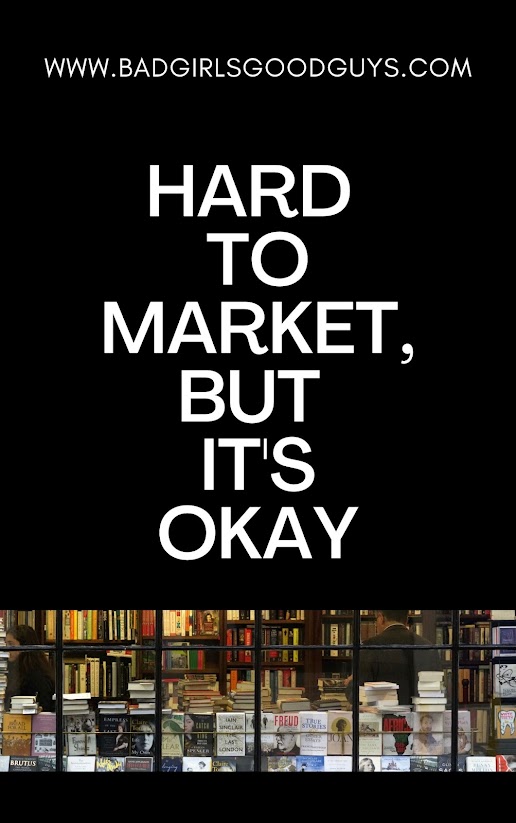Been in a bookstore lately? They seem to thrive more on marketing books than on books themselves. Outside a few small used bookstores, gone are the days of just grabbing a book a sitting and reading to get to know it, to try out something that grabbed you by either its synopsis or its cover (sometimes you can judge them by those) before you commit to buying it. They've even removed the chairs from most major chains that used to opt for a more library look and feel to appeal to bibliophiles.
I get. I really do. They have to stay in business in a changing economy. And they have to do that without increasing the costs to maintain a "This isn't a library" standard or using a 1:1 ratio between staff and customers for the best recommendations to lead to sales. So they need shortcuts like "If you liked this author, try this author" or "More books like The Hunger Games" or (my least favorite) "Here are new books by the same old million-selling authors you would look for deep in the store anyway."
 |
| Me, defined by graphic |
I'm not bitter. (I'm really not.)
In a previous essay, I wrote this, and I still stand behind it:
Publishers and readers look for categories, and not just any categories, but easy to define divisions. Those are easy to sell. A reader wants a mystery for the beach this summer, and bang, a clerk can walk said reader to the mystery section where he or she can be inundated by racks and racks of books by pretty much the same 100 authors. A reader wants a new urban fantasy, and poof, there’s a section for that, not to be confused with either sci-fi or mystery, or even epic fantasy. It’s quickt:.), it’s easy, and it’s basic marketing.
It gets even quicker, easier, and more marketable with series. Publishers love series. Readers love series. Both love them because it means they don’t have to think about what to read next. They don’t have to experiment with authors outside their “I know and love him or her” list unless it’s a strong recommendation by a friend. Series make money for that very reason. Series make careers for that very reason. And smart writers (unlike me) know how to take advantage of that market for series books.
You see, I have learned that the publishing world is a lot like that used bookstore I love to visit. It continues to work because it is built on categories that make people’s choices for them. If you like ___________ then you’ll also like ___________. Don’t feel bad if there’s not a new book by ___________ yet, just read this similar book by ___________ and you’ll be fine.
No risk. No muss. No fuss.
But also no wonder. No discovery. No adventurous expansion of your reading world.
Wisdom from a Friend
Recently I had a good friend (one of my best actually) stay with my wife and me for a few weeks while he awaited his move-in date for a new apartment. It was great. We talked about TV and movies and books and writing (when I wasn't sleeping off the end of the school year, that is). One topic that came up a few times in our conversations was a group he was in on social media about how to develop a backlog of books that would sell.
The end result of those conversations was me usually pushing back against trends and best-seller, copycat, popular fiction (yes, I'm a literary snob, but don't act like you didn't know that already). But it did reinforce for me the kind of writer I am.
 |
| Genres are best served broken. |
I'm the kind who is difficult to market in the existing publishing world. This is because of several reasons, all of which make me who I am as a creator.
First, I can't stand to be restrained to a genre. Just look back at my publishing history, and you'll see super-hero stories, pulp action heroes, hard-boiled detective fiction, literary shorts, zombies and ghoulies and ghosties... you name it. I like to write and read the same way I like my music playlist -- as varied as possible. Just like I love my music jumping from Vivaldi to AC/DC to the Archies, I like my fiction to jump from horror to mystery to pulp.
Second, I can't stand to copy trends. I was taught once that by the time you spot a trend, it's too late. The world has moved on and is looking for the next one. I was dumb enough to believe that and I still do.
Third, my stories begin with questions that intrigue me. Not marketing questions, such as "What is selling well now?" or "What are publishers looking for?" Instead, I begin with questions like, "What if rain turned into a human being and developed amnesia?" or "What if a young rocker still reeling from his father's abuse found a way to turn that anger into raw power?" or even "What if Josie and the Pussycats had been a lot darker -- a lot darker?" Then, from these kinds of questions, stories develop and bubble into soup inside my brain, never once thinking about the genre or category ramifications.
Yeah, I know, totally backward to the way publishing works from the other side of the big desk.
Things I Value in Fiction
So, yeah. I'm hard to market, and I know it. But I don't just know it. I also welcome it. I love it even. Because it's who I am.
In spite of that, there are certain things that always manage to wriggle their way into my work like a spider laying eggs in an urban legend's canal.
1. No single genre focus. I mentioned my fascination with multiple genres earlier and a little bit of each of them goes into all of my work. For example, I often get "lessons" from publishers because I tend to be too literary in my pulp stories. Or I tend to be too action-focused in my detective stories. Or when I try to take my super-hero fiction into the dark corners of the human psyche instead of focusing on the good-guy-bad-guy, white-hat-black-hat dichotomy. No matter what genre I am writing at any point, there is always a blender churning beneath the surface mixing and blending the genres and their rules.
2. No happy endings. Yeah, this is the big one. This is the one that will continue to keep me out of the bestseller list throughout my life. People often remark about the irony of me being an optimist who doesn't believe in happy endings. Well, I'm a firm believer that happiness is what you make it in whatever circumstances you find yourself in. (Now, that doesn't mean that you should strive to get yourself in a better situation, just that your happiness doesn't depend on it.) I also believe that as human beings, we never truly learn from getting what we wanted. That only reinforces our existing desires and beliefs. It's only when we face loss that we listen to the world around us and open up to learn anything new. That's why I'm a huge proponent of the bittersweet ending. The heroine loses her love, only to find she really is strong enough without it. The hero fails but realizes that puts him in a place of even greater opportunity. In Hallmark terms, the city girl finds that the country boy isn't right for he after all, but can return to the city with the lesson learned and move on. That kind of thing.
 |
| Paint with all the colors of the... steps. |
4. No epic stories. People love epics. But most of the ones I read, I just cant wait to finish and get back to something much smaller in scope. Sure, I enjoyed Lord or the Rings as a kid, but once I read that, why bother with Game of Thrones or Wheel of Time. (It's a generalization, I know, and some people love those characters, but not me, and most epics tend to suffer from the same old problems I hate to read, such as excessive world-building, long passages of description, characters who fall out of the narrative because they were written into book one and then forgotten about, force-fitting plot elements to make things happen because the author demands it, etc.) I much prefer the smaller, human stories. The detective whose case causes him to learn he'll never be able to have the woman he truly loves. The superhero in training who learns that no matter how powerful she becomes, she will still never get out of her sister's shadow. The husband who buys the perfect house only to realize that perfection just might cause is marriage to fall apart. I don't need to change the world in my stories. I just want to see the change in my characters.
5. There's no such thing as too much symbolism. I love using all the tools in my writer's toolbox, especially symbolism. I prefer it to be subtle, not overt. I'm a huge fan of the colors in Prospero's halls, the green light at the end of Tom and Daisy's deck, the sword salute at the end of The Sun Also Rises. I think these things only improve fiction and only hurt stories when used by people who dont' understand their use. I like fold flags that represent lost loves or partners. I like stacks of books that shed light on the story I'm telling just by virtue of their own plots and characters (recycling symbols, as it were). I like names that have meanings that give my characters more than just something to embroider on their bowling shirt.
6. No market chasing or trend-chasing. I mentioned this earlier, but I want to reiterate it here and slice it just a little different way. Each of my stories comes to me as a new tale, not something that consciously fits in a box. If it ends up fitting in a box, mostly like by the time I'm done with it, it has so many pointed jags and weird-shaped edges that it no longer fits. When I create a story, I write the story as it unveils in my head, not as it reacts to the goings-on in the world outside my head. This means even if I starting thinking about a teenage wizard when Harry Potter came out, trying to emulate the established "rules" of that series are the last thing on my mind. My teenage wizard will probably end up in Detroit working as an assistant to her private detective aunt who was a former burlesque dancer in her youth.
The Bottom Line
I guess, for me, it all boils down to this: When I was a young writer (both in age and in the craft) someone I respected told me to write what I wanted to read. Well, that really resonated with me.
 |
| A little of my library |
Something happened along the way in publishing to shift from varied to same, and while many modern writers are okay with that, I guess I just am not.
But like I said. It's okay.
I'm not bitter about it. (Honestly, I'm not. Why are you looking at me like that?)


No comments:
Post a Comment